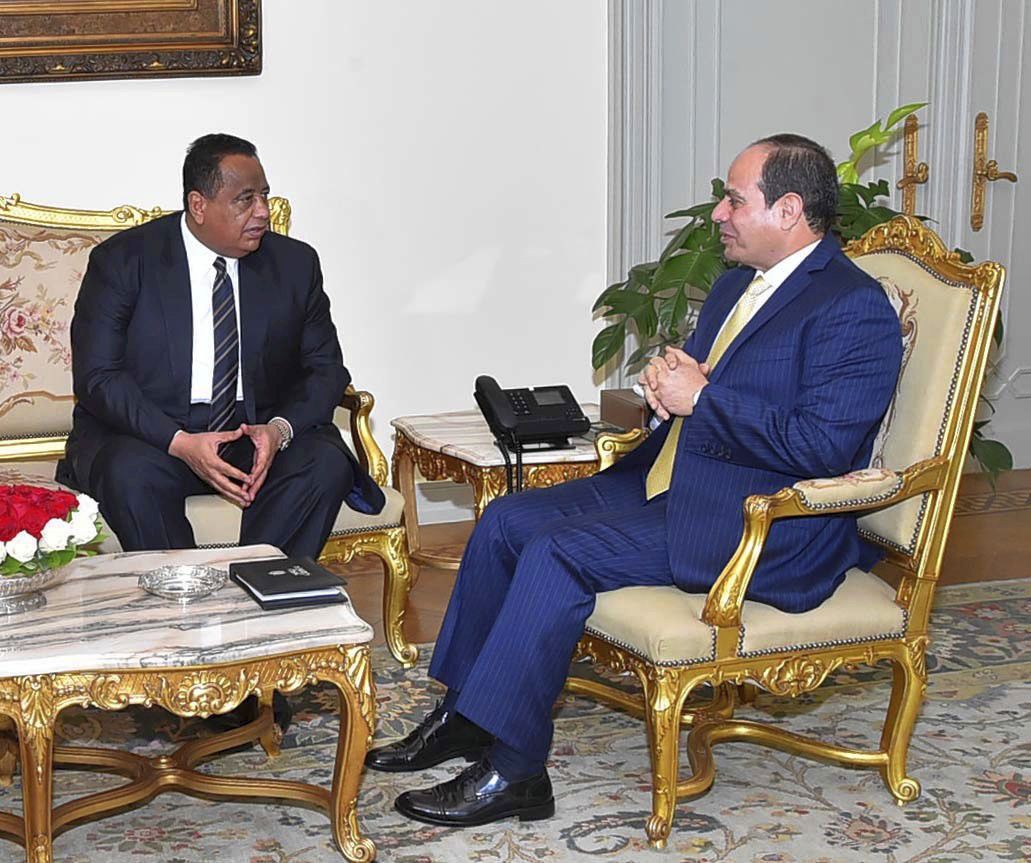CAIRO — Officials from Sudan and Egypt on Saturday held “honest” and “transparent” discussions following months of tension between the two Afro-Arab neighbors, but appeared to make little headway to patch up their differences, primarily over a border region held by Cairo and claimed by Khartoum.
Sudan’s visiting foreign minister, Ibrahim Ghandour, and his Egyptian counterpart, Sameh Shoukry, spoke of the “holy” relations binding the two Nile-Basin nations, but reported no tangible progress in a joint news conference they held in the Egyptian capital after talks.
“There are deeply entrenched relations capable of overcoming whatever is inflicted upon them,” Shoukry said, striking a positive note. “We are working toward a frank dialogue capable of removing misunderstandings and confusion.”
At the center of tensions between the two is sovereignty over the so-called Halayeb Triangle on the Red Sea, an issue that dates back to colonial times. Egypt refuses to submit the dispute to international arbitration, a Sudanese request.
The tension was further stoked when Sudan decided recently to ban all agricultural and animal imports from Egypt over health concerns, a claim hotly disputed by Cairo. Adding insult to injury, Sudanese President Omar al-Bashir last month accused Egypt of arming rebels fighting against his government in the western Darfur region. Egypt has denied the charge.
On Saturday, Ghandour, the Sudanese minister, told reporters he delivered a message from Bashir to Egyptian President Abdel-Fattah el-Sissi on bilateral relations and conveyed what he called some of Bashir’s “concerns.”
He did not elaborate, but added that the decision to ban Egyptian farm and animal imports was made on technical basis and acknowledged that a Cabinet decision to ratify the ban last week may have been ill-timed.
He said he proposed joint patrols with Egypt to monitor their porous land border to ensure that militants don’t cross into Egypt and carry out attacks or join an Islamic insurgency centered in the Sinai Peninsula. Cairo maintains that Sudan has offered refuge to members of the Muslim Brotherhood, an Islamist group it labels as terrorist.
The media in both Egypt and Sudan have exacerbated the two nation’s differences, with sensational comments and some biting mockery that, on one occasion, touched on the size of Pharaonic pyramids in both countries.
Egyptian media reports have also suggested that Sudan’s renewed claim to the border region and the import ban were inspired by its ally and backer Qatar, a tiny but energy-rich Gulf state at sharp odds with Egypt over its position toward certain Islamic groups. Some commentators also harshly mocked al-Bashir, who has been in power since he led a military coup on 1989 and is on the International Criminal Court’s wanted list for committing crimes against humanity, war crimes and genocide in Darfur.
Mostly desert Egypt is keen to mend ties with its southern neighbor at a time when it’s gripped with anxiety over the impact on its vital share of the Nile waters by the ongoing construction of a giant dam in Ethiopia, whose highlands are the source of the Blue Nile, the waterway’s primary tributary that accounts for some 80 percent of the river’s volume.
Negotiations between Egypt and Ethiopia over the dam’s impact, particularly the timetable for filling the proposed reservoir behind it, have made little progress over the years. In contrast, Sudan, which controls the middle reaches of both the White and Blue Niles, has moved closer to Ethiopia in recent months, in part hopeful of securing cheap electricity from the dam’s hydroelectric power station. — (AP)


No comments:
Post a Comment